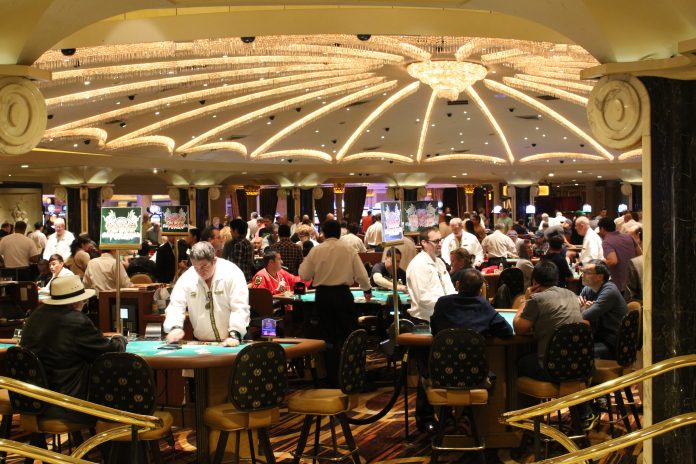Most gamers enjoy a self-controlled and rewarding betting experience without significant mishaps. Unfortunately, some become incredibly addicted to the game and end up messing with their lives. It is worth pointing out that compulsive gambling victims also display addiction traits for alcohol or other drugs. You see, betting addiction activates the same brain pathways affected by alcohol and drug cravings. For this reason, the American Psychiatric Association listed gambling addiction under the Diagnostic and Statistical Manual of Mental Disorders, 5th Edition (DSM-5).
There are evident disparities between gaming compulsion and other forms of addiction. For instance, betting is a behavioral habit, while alcohol and drug abuse fall under substance addiction. Still, both conditions share various commonalities and similar adverse consequences. This article strives to raise awareness on the connection between gambling and alcoholism addiction and how to minimize the effects.
-
Escalation Patterns
It is no surprise that addictions deteriorate with time. The progression happens because the human brain craves more for a thrill, euphoria, or excitement instigated by a source of addiction. Some addicts become desperate and develop a carefree attitude towards other people and themselves in the process. Often, this leads to further deterioration of their addictive traits.
Even if dropping a habit is never a walk in the park, placing bets at licensed casinos plays a significant role in minimizing compulsive gambling. Casino sites in Ireland understand this well and offer responsible gambling advice and tools to their clients. For instance, they encourage deposit limits, cooling off, and self-exclusion moments to keep the behavior in check.
-
Relapse
Despite successful addiction measures available, relapse rates continue to propel at an alarming rate. Statistics reveal that approximately 70% of gaming addicts return to their old habits soon after treatment. On the other hand, roughly a third of problem drinkers relapse within a short sobriety time. Relapse is a frustrating hindrance to the recovery process. Note that it can be temporary or long-term with differing symptoms.
There are several triggers to relapses, but isolation and boredom take the lead. More so, alcohol and gamblers addicts may struggle to keep off from their dependence when bored. However, you can replace harmful habits with hobbies like playing chess or horse racing. In addition, use the time to volunteer and help the needy in society. What’s more, join helpful support groups and learn practical solutions to the problem at hand.
-
Poor Finances
Uncontrollable alcohol drinking and gambling have negative implications on finances. After all, every glass of wine or a session with live dealers costs money. Depending on the habit frequency, addicts spend more than $500 daily. Hence, they may end up digging deeper in the pocket or resulting in unlawful means like cheating to support the addiction.
Most unfortunate, addicts rarely sustain their source of income and often get sacked because of inferior performance. Ultimately, their financial miseries worsen as the addiction progresses due to a stressful broken life.
-
Isolation
Compulsive gambling and alcohol addiction over-stimulates the human brain and boosts a defensive reaction. The impact affects an individual’s reward system, which minimizes the urge to seek pleasure or satisfaction in other things rather than gambling and alcohol.
Experts refer to this condition as a preoccupation. As a result, affected individuals isolate themselves from the outside world and spend considerable time preoccupied with a particular habit. In their misery, they agonize on how to get money to finance their addiction, sometimes leading to deceptive means. Unfortunately, addicts waste a huge chunk of their lives engrossed in the habit instead of engaging in constructive activities. Of course, this tendency is a recipe for several detrimental effects in a person’s life.
-
Withdrawal Symptoms
Individuals downtrodden by both conditions often complain of similar withdrawal patterns. Common withdrawal symptoms can be psychological and physical and vary depending on the level of addiction. Bear in mind that physical symptoms can be fatal and often require immediate medical attention.
Either way, most addicts suffer from depression, poor concentration, listlessness, insomnia, increased anger, anxiety, and others. Regrettably, the warning signs worsen when addicts stop or reduce their unhealthy habits. Hence, controlling the addiction becomes nearly impossible, making affected individuals extremely powerless.
-
Unhealthy Personal and Family Life
Addicts usually cause a whole load of anger, stress, sadness, and anxiety to their loved ones. As they choose gambling and substance use over close people in their lives, mending these relationships becomes impractical in the future.
Moreover, addiction affects an individual personal journey, especially on hygiene, sleeping patterns, career, and mental or physical wellbeing. Without a doubt, family members and friends would rarely spend time on unresponsive individuals resulting in a more frustrating and lonely life to the addicts.
Bottom Line
Managing gaming or alcohol addiction is never an easy task. Nonetheless, with proper professional help, the recovery process becomes less tedious and promising. Most preferred treatment options include medical detox and therapeutic practices like Cognitive Behavioral Therapy and Motivational Interviewing. Moreover, medically assisted alternatives such as mood stabilizers and antidepressants work magic in fighting addiction.

